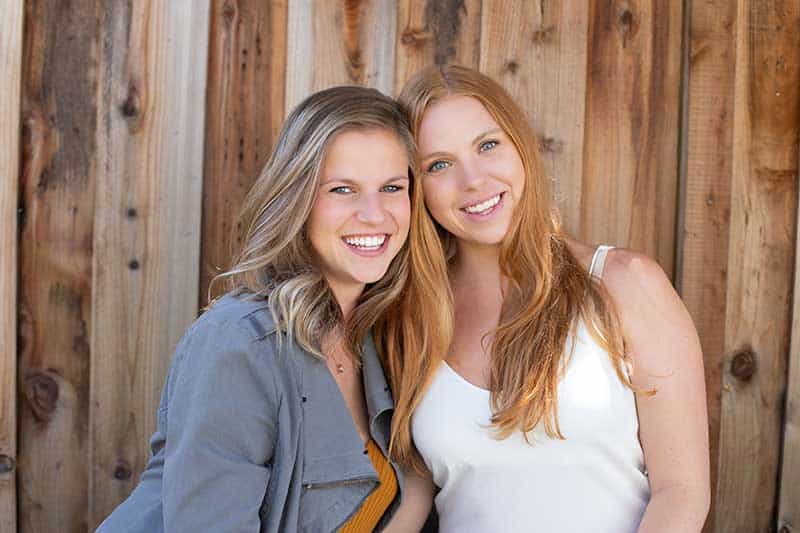Insights from Pediatric Sleep Expert Caroline Morris

At Bay City Doulas, community is our cornerstone. We’re dedicated to building strong connections within our local network to enhance the support and resources we offer to both our doulas and families. This week, we’re thrilled to share aour interview featuring Pediatric Sleep Expert Caroline Morris.
What inspired you to specialize in pediatric sleep consulting?
When I was 20 weeks pregnant with my daughter, it was the middle of the pandemic, and
my (then) husband and I moved across the country. I was let go from my job and dove
head first into motherhood. I had dreamed about being a stay-at-home mom for as long
as I could remember, and I wanted to be the best I could be. I read every book, listened to
every podcast, and followed all the Instagram accounts.
Although I had all this information, I still felt anxious and stuck. I kept my daughter on a
super tight sleep schedule so as not to mess with her good sleep habits, and it caused a lot of
stress. When my son was born, I naturally became more flexible because we were
always on the go for my daughter’s activities. I naturally became way more flexible, and I
loved this version of my mom-self.
When I launched my business, I did it on the foundation that your approach to sleep can
be consistent but doesn’t have to be rigid. You can still have great sleepers without being
tied to being home.
What are some common misconceptions about infant sleep that you frequently encounter in your practice?
A lot of people think that sleep training is just “cry it out,” and there are so many more
methods and techniques that are gentle, and work with every family’s dynamics and
mindset. As a sleep consultant, I work to support families and create a plan specifically
for them. There is no one-size-fits-all all, and babies aren’t robots, it’s important to remember
that.
For new parents, understanding sleep cues and patterns can be overwhelming.
What are some key signals they should look for in their baby’s behavior?
I always want parents to get to know their baby and their babies’ sleepy cues. When we
work together, we focus on wake windows, full feedings, and learning to fall asleep
independently. I work to empower parents to feel confident and give them the support to
help their babies get the sleep they need. However, sleepy cues are important, and there
are many common signs. Some are red eyebrows, fussy, and zoning out.
How do the sleep needs of infants differ from older children, and what are some key milestones parents should be aware of?
As babies grow, their sleep needs decrease. Between 0-24 months, your baby will go from
6 naps a day to 1 nap a day. They go from needing about 18-20 hours of sleep to a 24
hour period to 13 hours. Just like anything needs change. Yes, all babies are different
and some have higher sleep needs and others lower, but these averages are good to aim
for. Babies who are gaining and growing strong can start sleeping longer stretches at
night, around 6 weeks. You can let them wake you to feed as opposed to you waking
them up every 2.5-3 hours. I suggest for toddlers, hanging onto their naps for as long as
possible. If your toddler is between 3-4 years old and bedtime is becoming a struggle
then it may be time to drop the nap. When you drop the nap, I suggest transitioning to
a quiet hour. An hour where they can play games, read, or do puzzles in their room quietly
for an hour.
Many parents struggle with establishing a consistent sleep routine. What are your top tips for creating a bedtime routine that promotes healthy sleep habits?
My biggest suggestion is something that you can always be consistent with. It doesn’t
have to be elaborate but I do suggest having something that you can do every night (and
modified for naps.) Another big tip is laying your baby down awake once you’ve
completed your routine. I also LOVE magnesium lotion! A typical routine for a baby could
look like this; diaper + Sposie, lotion + magnesium cream, pj’s, bottle, books, snuggles,
crib.
Co-sleeping is a topic that often divides parents. What are your thoughts on co-sleeping, and what safety measures should be taken if parents choose this approach?
I’m a firm believer that families have to do what is right for their family. If this means
co-sleeping then go for it. However, as a mom and sleep consultant, I do believe babies
should sleep in their own safe place. They will sleep better and so will you! If you want
your baby close, there are a lot of products out there like bedside bassinets. But just to
be totally transparent, my daughter (2.5yrs old) occasionally will sleep in my bed. I love
these special occasions and think if your baby is old enough and sleep trained then you
can definitely introduce these special nights.
For parents who are transitioning their baby from co-sleeping to their own crib or bed, what strategies do you recommend to ease this transition?
I really am a firm believer in doing what is best for baby and family. There is something
so sweet and comforting about co-sleeping but also I understand wanting your space
back. This transition can be as slow or fast as your want it but regardless of the pace it’s
about being consistent. Offer them time in their crib for both sleeping and playing. Give
them time to learn the space.
Sleep regressions are a dreaded phase for many parents. Can you shed some light on what causes sleep regressions and how parents can naviagte through them?
PRACTICE! PRACTICE! PRACTICE!! Regressions tend to fall right around the time when
babies are learning new skills. Practice those new skills during their wake windows.
However, I’m a firm believer that if you set a solid foundation of sleep from day 1, you will
see less regressions. When your baby has the skill to independently put themselves to
sleep they will also apply this skill during regressions.
Many parents worry about the impact of sleep training on their baby’s emotional well-being. What evidence-based insights can you provide to alleviate these concerns?
When you work with me, just know that I will never suggest having your baby cry it out
for long periods of time. The techniques I use are very gentle and before we start
working together we spend a lot of time getting to know each other. I want parents to
feel confident and know that they are doing something beneficial for the kids. Also,
emotional connection continues to grow, change, and develop. Supporting your child in
sleep independently is not going to break that bond.
What advice do you have for parents who are dealing with frequen night wakings or difficulty getting their baby to sleep through the night?
I always ask them a lot of questions before giving advice. How old is baby? Do you place
them in their sleep environment awake? How quickly do you feed them once you hear
them cry? Do you always feed them until they fall asleep? Once we get answer to these
questions I can give them advice and tips on to fix night wakings. For moms who
breastfeed, I do think there is a balance from feeding them at every wake up to
understanding what their cries mean and establishing a plan. Overall, once your baby has
learned to fall asleep independently you’ll see these night wakings lessen.
How can postpartum doulas support families in establishing healthy sleep habits for their newborns?
Postpartum doula’s are so important for so many reasons but the two that stick out the
most are; giving parents the opportunity to get the rest and connection with their baby is
so important. I’m a firm believer in using resources that are available to us to ensure that
we can be our best selves. I think investing in a Doula takes things off a parent’s plate
while ensuring that love and bond for their baby. And two, I’m a firm believer in sleep
shaping. I think when you are given the opportunity to have a strong foundation of sleep,
you can more easily fall into strong sleep habits. Doula’s are knowledgeable, kind, and
supportive. Working with one gives parents peace of mind while being supported.
Are there any red flags or signs that indicate a baby may be experiencing sleep-related issues that require professional intervention?
I always make sure that families get the a-ok from their Pediatrician’s before moving
forward. If there seems to be a problem I always recommend them seeking medical
advice. Although sleep training is incredibly safe I always encourage families to use all
the people in their village.
As a pediatric sleep consultant, what brings you the most satisfaction in your work, and what keeps you motivated to continue helping families?
I love when parents see success and feel confident in the choices they’ve made. I always
like to say, I give parents the information and support their needs, parents implement the
plan with confidence and love, and babies work towards gaining the skills necessary to
fall asleep on their own. When parents see their hard work pay off and the whole family
gets the sleep they need it’s really exciting and never gets old.
Is there anything else you want to add?
When I was a first time mom I was super rigid and really stuck to my daughter’s schedule
because it worked – what I realized with my son is that I can be flexible and enjoy our
lives and he is still a great sleeper. Every baby is different and I do think my daughter
needed more routine than my son, but I just want to share that whatever approach you
decide to do, be consistent with it. Babies aren’t robots and there isn’t a one size fits all
approach for every family.
Where can potentially interested clients go to learn more about the work that you do?
They can reach out to me via email at Caroline@sleep4littles.com, my website
www.sleep4littles.com or through instagram @sleep4littles
Thank you for joining us on our blog this week! As we conclude this week’s blog, we extend our gratitude to Caroline Morris for her invaluable insights into pediatric sleep. Remember, restful nights are within reach with the right support and guidance. If you feel you could use additional support please reach out to Caroline or visit our website; we will gladly help to find support for you.
Thank you for reading this week’s post, ”Sleep Solutions: Insights from Pediatric Sleep Expert Caroline Morris.” For more tips and tricks on all things pregnancy, postpartum, and parenthood visit our weekly blog.

